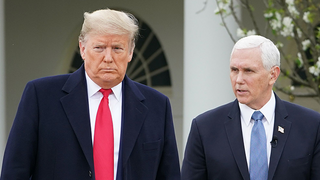War, natural disasters and pandemics thrust attention onto incumbent politicians, those charged with responding to catastrophes with the command of the resources of the state. Partisan conflict typically dissipates, if only for a while, as societies focus on the here and now of getting through the crisis. Often, the immediate political consequence of crisis is a bump in support for incumbents, an effect so predictable and regular that political scientists refer to it as the “rally around the flag” phenomenon.
A moderation of partisan disagreement is an essential pre-condition for the “rally around the flag” effect to emerge. When party leaders ease criticisms of one another — with admonitions about “rising above partisan politics” becoming real — the frame of evaluation of incumbent politicians changes. The public sees incumbents less as partisans and more as leaders. And as we’ve seen in Australia in recent weeks, under these circumstances incumbents will see their job approval numbers and political capital grow.
But in this regard, America is different. Like almost all public issues in the United States, public opinion about COVID-19 has been intensely political from the get-go. Trump himself and sympathetic voices in the media spent a good couple of weeks either talking down the severity and risks of COVID-19 or over-stating American preparedness for the pandemic. For Democrats and media outlets sympathetic to their points of view, this is yet additional evidence of Trump’s unfitness for office, and the importance of a Democratic win in November.
Biden has been capitalising on being seen as a safe pair of hands in the midst of crisis for weeks now.
As a result, as recently as a week ago, Republicans were twice as likely than Democrats (62 per cent to 31 per cent) to say that the “news is greatly exaggerating” the seriousness of coronavirus. Some American conservatives were even drolly referring to the reaction to COVID-19 pandemic as a “Dempanic”.
The last week has seen less partisanship in the American national conversation about Coronavirus. Taking their cue from the White House, right-of-centre American media is now far less likely to downplay the seriousness of the pandemic. In recent days Trump’s messaging has changed and a “whole of government” response become evident, with the Federal government catching up with where many state and local governments are, and where many US private institutions landed weeks ago on the pandemic’s seriousness.
To date, there is no evidence of Trump gaining political capital from this crisis, the average of many regular measures of Trump’s job approval at 43 per cent, marginally on the higher side of approval ratings for Trump, who has some of the least variable poll numbers ever seen for an incumbent US president. Americans, it seems, knew a lot about Trump as he came to office, and few have changed their minds since.
Joe Biden has been the clear political winner from the Coranavirus epidemic. This week saw presidential primaries in two large and one midsized state, Florida, Illinois and Arizona. Biden handily defeated Sanders in all three, but especially Florida, where (1) legions of older voters voted by mail, and for Biden, rather than exposure to the virus with in-person voting; (2) Sanders’ comments that it would be “unfair” to say “everything is bad” about the Castro regime in Cuba doing him immense damage among with Florida’s large Hispanic population.
The pandemic has not only allowed Biden to trumpet his experience, but Trump’s political and policy missteps. The rally here is not for the incumbent, but for the challenger.
Biden has been capitalising on being seen as a safe pair of hands in the midst of crisis for weeks now. In the last debate prior to the South Carolina primary — only three weeks ago, but seemingly longer — Biden first pointed to his experience in government “with Barack” during the Ebola outbreak as uniquely equipping him for leadership through the Coronavirus pandemic. Biden is almost surely destined to be the Democratic nominee, and indeed probably would be had not the pandemic led Ohio, Georgia and Louisiana to push back their primaries. No one has come back from the delegate deficit Sanders now faces.
The pandemic has not only allowed Biden to trumpet his experience, but Trump’s political and policy missteps. The rally here is not for the incumbent, but for the challenger.
Biden’s resurrection is the political equivalent of a “flight to quality” in financial markets, a flight to normalcy, to competence and — as Biden likes to remind us — to empathy and compassion. Biden’s run of recent victory speeches sound ever more like the reassurances of an incumbent president to an anxious public.
More than a few Democratic primary voters have assessed that any dalliance with democratic socialism under Sanders is not what the times call for, that the urgency of defeating Trump is the paramount — perhaps only — relevant consideration.
One of the many incongruencies of the Trump presidency is how his approval numbers have been mired in the low 40s given the strength of the American economy. Now that economic strength is gone. The stock market has given up all of its gains under the Trump presidency. Far-reaching, bold interventions are finally coming, and we’ll have plenty of time to assess their efficacy — and political impact — before the election in November.
But betting markets already assess that Trump is real trouble, with the odds of him defeating Biden now at even money. If Trump loses in November, it will largely be because of what has happened in these last three weeks.






